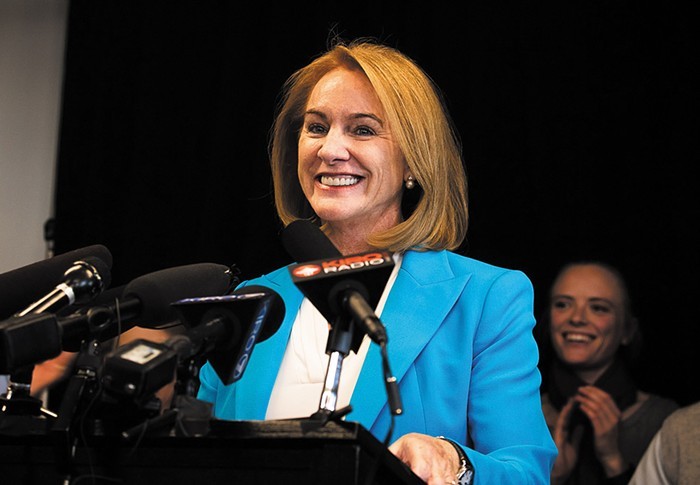
Look, it's no secret that Mayor Jenny Durkan hadn't thrown her support behind Councilmember Kshama Sawant's and Tammy Morales' corporate payroll tax legislation, which, up until it became legislation they were referring to solely as the Amazon Tax. No one really expected her too because, you know, the head tax and uh, Durkan being Durkan.
But damn, Durkan laid it all bare when she spoke to KING5 on Wednesday evening, the same day the council's Budget Committee heard the details on the first bill of the three-bill corporate payroll tax package.
"Yeah, that never is going to happen," Durkan told KING5, "and I think it's irresponsible for anyone to say that that's even possible."
The goal of the payroll tax is to tax the top 2 percent of Seattle businesses (otherwise known as businesses that report $7 million or more in annual employee payroll). It would be a 1.3 percent tax on payroll and would raise around $500 million if it all goes to plan. The first chunk of change ($200 million) would go into the pockets of 100,000 low-income families and vulnerable populations disproportionately impacted by the COVID-19 pandemic in the form of $500 checks spread across four months. After the crisis is over and dealh with, then the tax money will build affordable housing and support green infrastructure.
That initial $200 million would be paid out of inter-fund loans from other funding sources since the actual payroll tax, if approved, wouldn't go into effect soon enough to get money to people starting this June (which is the goal).
Durkan took issue with that in her KING5 interview:
"The interfund loans, the funds that they want to rob, I'm not sure that they have the authority to do that. Because those were all voter-approved initiatives," explained Mayor Durkan. "As importantly, to the extent that there is the ability to have interfund loans, which is a budget technique, we may need that just to balance the budget this year. So there is no scenario under which people would receive checks this year. And I think that's really not responsible to tell people during these really hard times."
She also balked at what else would be necessary to make this thing happen:
"I know for a fact that in order to set up a payroll tax, we would have to create a whole new department in the Seattle budget office and revenue office to collect the tax, we'd have to get new computer systems in place. The council knows that we would not be able to collect those revenues until 2022. And that's if nobody challenges it, and if it passes as it is, so there is no scenario under which money would be collected until that time."
I've asked Morales and Sawant for comment and will update when I hear back. In the meantime, Durkan dished on KUOW Thursday afternoon about the tax .
KUOW's Bill Radke ended his weekly interview with Durkan by asking her whether a payroll tax could plug the up-to $300 million hole in Seattle's budget.
"No, it wouldn’t," Durkan said, sounding exasperated. "Even the proponents could tell you that money can't be collected until 2022. A payroll tax has no ability to plug any hole in what we are facing this year or next year and there’s no mechanism by which you can generate money to send checks to people or get funds to people this year."
Radke pointed out that Sawant and Morales were planning on borrowing money from the city and paying it back once the tax dollars started rolling in.
"It doesn’t work that way," Durkan said, "because a number of the funds that people have identified—it’s unclear whether people can access those. We may need to borrow [from those funds] to plug that [budgetary] hole we have."
Durkan continued: "When you borrow money, you have to pay it back. When you pay it back you have to have a pretty good forecast that you’re going to be collecting the revenues necessary to pay it back."
"It’s an absolute fact that a tax increase will not plug that hole," Durkan said.
Radke asked what solutions Durkan had in mind for getting that money then.
"We’re going to have to look at a whole range of things," Durkan said. She cited that the city was getting federal money (though, Ben Noble in the city's budget office told the council on Wednesday that federal funds come with spending strings attached and most likely will not be our saving grace) and that we'd have to know exactly how much money is needed before a solution is found.


















